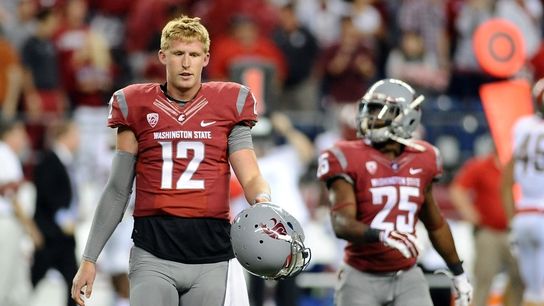Former Washington State quarterback Connor Halliday was not drafted over the weekend.
Four seasons as a Cougar - including three seasons logging a career's worth of stats under Mike Leach - put Halliday on the NFL's radar, but a skinny frame and a season-ending leg injury delayed his entry into professional football until late Saturday, after the events in Chicago had come and gone, when he signed a contract with the Washington Redskins as an undrafted free agent. The path from there to professional glory is dark and littered with the skeletons of many talented, determined players just like Halliday.
But this story isn't about him. It's about his mom.
Jessica Halliday, a writer and professor at Gonzaga, penned a beautiful letter for MMQB.com on her experience watching her son put himself - and put her - through everything it takes for a lanky kid from eastern Washington to reach the NFL. You'll have to head to the site to read the entire thing (which we strongly encourage you to do) but there's plenty that our audience can identify with:
I knew from the way his hands came up as he went down that it was bad. Nearly 20 years of watching Connor has schooled me. Hands to the helmet after a hit: bad. I stood up in the stands, watching for him to move. No movement. People kneeling. Idiot in the row across, “Halliday’s f—— useless.” When Coach Leach ran out and Connor reached up—Help me—I bolted, grateful we were playing at home so I knew my way to the locker room. People stared; crowd control parted at my shout, I’m Connor’s mom! Trainers directed me not to the training room but to the driveway below, to the ambulance waiting for my son.
Dads, uncles, grandfathers, coaches, teammates, opponents, broadcasters—one thing they agree on is Connor’s unwavering focus on a W. The media coverage and recognition and hype—these things mean nothing to Connor. The thing that matters to Connor—what is life or death to him, almost literally—is to win. I could tell you a story or two about that. I could tell you about concussions he’s denied, having memorized the “test” used to determine a player’s capacity to endure further impact. I could tell you about the liver laceration he sustained early in a game his redshirt freshman year, passing out on the bench from pain during a timeout, lying to his coaches and the concerned officials so he could remain in the game and get that win. I could tell you about his junior year in high school when he threw up from abdominal pain after a particularly hard-hitting game, warranting another trip to another emergency room where another surprised doctor told me he must be in terrific pain, his spleen in danger of rupture, enlarged by the mononucleosis he was sick with, not that any of us knew it. That day, Connor lay on the E.R. table, furious with the doctor and then me as I tried to make sense of it for him, that he was unable to play in next week’s game. You can’t stop me. I’d rather die in the game than not play.
And this:
Football owns Connor in a way that has nothing to do with love of the game. It’s in him; it simply is him. I believe an X-ray of his heart would reveal it to be oblong-shaped and made of pigskin, though it’s my own heart that bears the trademark white threads—scars—across the top, the same ones Connor grips for purchase before he launches the rock, and my heart along with it, through the air.
Connor’s passion (did I say passion? I meant enslavement) has taken (did I say taken? I meant dragged) me across every terrain, geographic and physical and emotional. Along the way I’ve earned real friends, mothers belonging to an elite club whose rite of passage is harsh, a cruel hazing ritual consisting of being forced to watch your son injured, praised, chastised and ridiculed, all in service of what some people call a game. Mothers of pitchers, mothers of point guards, mothers of quarterbacks and middle linebackers—we are a unique strain of women. We sit together at games with ears shut against the yelling men in the stands who believe they have the skills to criticize our sons; plan massive dinners for boys who can’t afford to lose one pound; hold hands, silent, in emergency rooms. Our kids ought to be tough. Look at what their mothers can endure.
